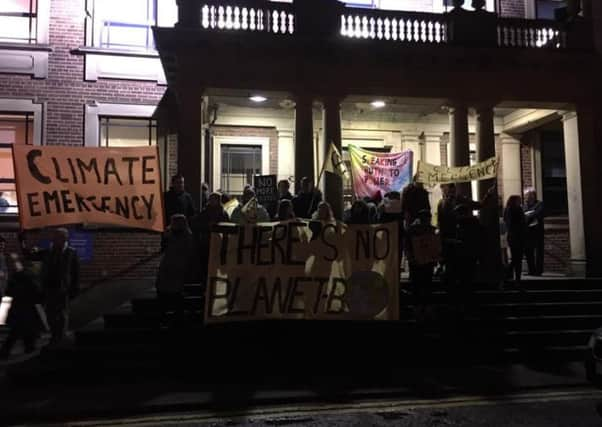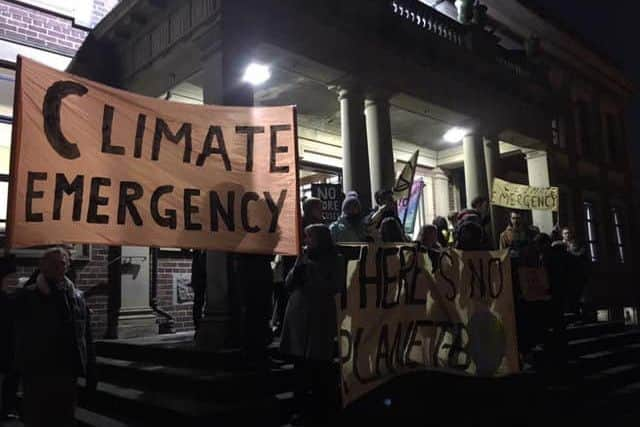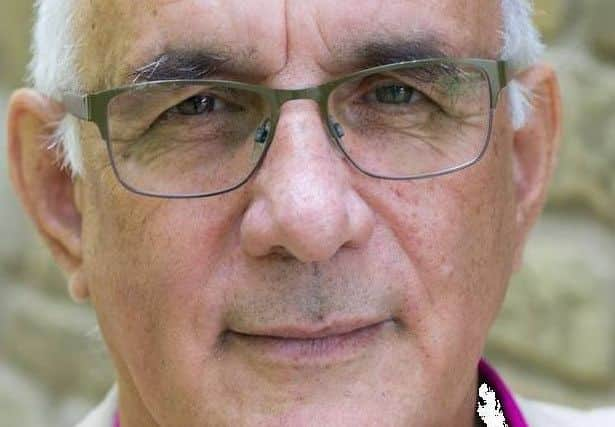Lancaster declares ‘climate emergency’ with 2030 zero carbon target


A meeting at Morecambe Town Hall saw a demonstration outside on the steps, with young people flying banners stating “there is no planet B”.
Inside, the full council meeting heard from young people, scientists from Lancaster University, and others, who all expressed grave concern over irreversible climate change over the coming years.


Advertisement
Hide AdAdvertisement
Hide AdA motion submitted by Coun Kevin Frea coincided with a petition backed by more than 1,500 young people from the Lancaster area, which also called for climate emergency to be declared.
Leicester, Bradford, Sheffield, Oxford and Cornwall among others have all declared climate emergencies in recent weeks.
Lancaster Girls Grammar School pupil Rosie Mills, who launched the petition, told the meeting: “The young people of Lancaster are the generation that will feel the effects of global warming, yet we are currently seeing little action to reduce or mitigate these effects.
“As a generation, we have never lived in a time of stable climate conditions.


Advertisement
Hide AdAdvertisement
Hide Ad“Despite us having been taught since a young age of the dangers of climate change, the majority of adults in our community have not yet changed in the ways we have been taught are available to us.”
Dr Paul Young, climate scientist and senior lecturer at Lancaster University’s environmnent centre, told the meeting: “The science is clear that limiting global warming to 1.5 Degrees Centigrade is our best chance of preventing loss of unique and threatened ecosystems such as coral reefs.
“Above this level of warming we not only risk losing these wonderful environments, but the resulting climate change exposes us to multiple risks in food, energy and water sectors, and reduces the geographical range of a host of animals, plants and insects.
“We will exacerbate existing hazards and create new ones, particularly for vulnerable populations in Africa and Asia, but also flood-prone communities like our own.


Advertisement
Hide AdAdvertisement
Hide Ad“Beyond that, as our lives are so interconnected through commerce and services and their supply chains, these global impacts will have local ramifications”.
Last summer, the Labour group which runs Lancaster City Council won support for proposals which committed the authority to achieving 100 per cent clean energy across its activities by 2050.
But the party’s Halton ward councillor, Kevin Frea, told councillors that a new report by the Intergovernmental Panel on Climate Change had warned that urgent action was needed around the globe within the next 12 years to tackle climate change.
He said the council needed to act faster in order to avoid extreme weather - like the flooding which has hit the district in recent years – becoming more frequent and severe.
Advertisement
Hide AdAdvertisement
Hide AdThe proposals mean that the council will set up a Climate Change Cabinet Liaison group immediately, involving councillors, residents, young people and academics.
The group will review the council’s 2010 climate change strategy and come up with costed plans to cut carbon emissions which will feed into next year’s budget.
Coun Frea backed amendments to his proposals by his Labour colleague and University ward councillor Oliver Robinson.
These mean that the council will also convene a Citizens’ Assembly this year to support those plans, maximise its impact in sectors including health, agriculture, transport and the economy, and work with other agencies to make the district zero-carbon by 2030.
Advertisement
Hide AdAdvertisement
Hide AdCoun Robinson, who is one of the council’s youngest councillors, said that young people should be fully involved in the process rather than working separately through their own climate panel.
Possible measures to tackle climate change could include increasing energy efficiency of buildings - which will also help address fuel poverty - further development of solar and renewable energy, and replacing the council’s vehicle fleet with electric or hydrogen powered vehicles.
Coun Caroline Jackson asked Lancaster City Council’s director for communities and the environment whether there was now scope for adding solar panels to council housing.
She said: “I was told (in the past) that we can’t do that because some people will get them and some people won’t. Given the climate emergency, would this now be considered?”
Mr Davies answered: “Yes”.
Advertisement
Hide AdAdvertisement
Hide AdCoun Frea said: “I’m thrilled that these proposals attracted support across the council chamber.
“Climate change has already had a devastating impact across our district through the flooding which has caused so much misery in recent years.
“We all need to do our bit and it was vital for us a council to commit to acting faster and going further in reducing carbon emissions and encouraging other agencies to follow suit.
“The hard work starts here.”
Conservative City and County Councillor Charlie Edwards said that the council should look at Passivhaus development, reconsider Bailrigg Garden Village, and put in smart meters to enable the use green energy suppliers in council houses.
Advertisement
Hide AdAdvertisement
Hide AdHe added that Lancashire County Council’s pension fund is the biggest owner of wind turbines in Portugal, and had invested in new greener trains on the Greater Anglia line.
He said: “I’m working with Green Party County Councillor Gina Dowding on a responsible investment fund, and I’m involved in the Air Quality Champions Network, which aims to improve air quality across the county.
“Lancaster district should be the bastion for green cities in the north of England, and I think it’s awesome that we have seen such an important issue raised by our young people.”
Green Party Coun Jon Barry pointed out that the council had managed to reduce the gas and electricity consumption at Salt Ayre Leisure Centre more than eight years ago, and that solar panels there were now making a profit for the council.